Key takeaways:
- Regulatory risks in the crypto space require constant awareness and understanding, as legal shifts can significantly affect market dynamics and investment strategies.
- Compliance is essential for building trust and safeguarding investments; overlooking it can lead to severe consequences such as legal scrutiny and market exits.
- Effective crypto analysis engines utilize real-time data, customizable analytics, and educational resources to empower investors with informed decision-making tools.
- Engaging legal experts and conducting scenario analysis are crucial strategies for anticipating regulatory changes and adapting investment approaches proactively.
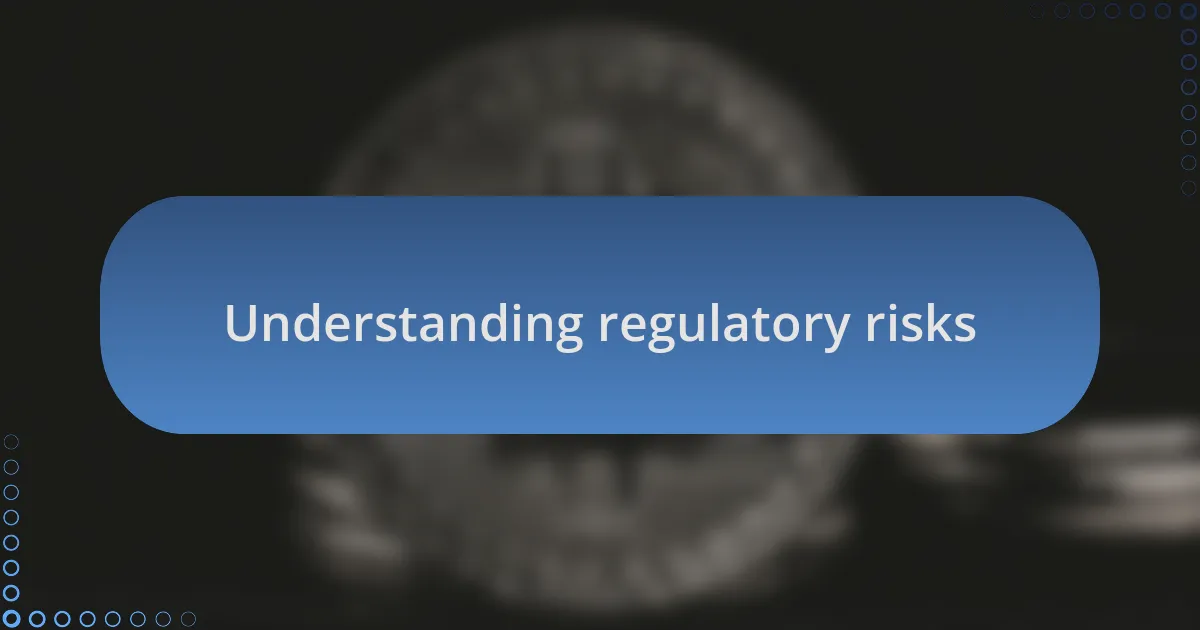
Understanding regulatory risks
Regulatory risks in the crypto space can be overwhelming. I remember the uncertainty I felt when a major regulatory announcement shook the market. It made me wonder: how do we even begin to anticipate these shifts? The landscape is constantly changing, and that unpredictability is what truly heightens the stakes for investors and companies alike.
When diving into the world of cryptocurrencies, understanding regulations is crucial. I often find myself reflecting on how a single policy change can ripple through the entire industry, affecting everything from market confidence to innovation. Have you ever considered how the volatility of legal frameworks can impact your investment strategy? It’s a valid concern that keeps many of us on our toes.
The emotional weight of navigating these risks can be daunting. I vividly recall the anxiety of wondering whether the latest regulatory move would cripple my plans or bolster them. It’s like walking a tightrope; one misstep could lead to significant losses. Wouldn’t it be easier if the regulations were straightforward? However, embracing this complexity often leads to richer insights and a stronger foundation for making informed decisions.
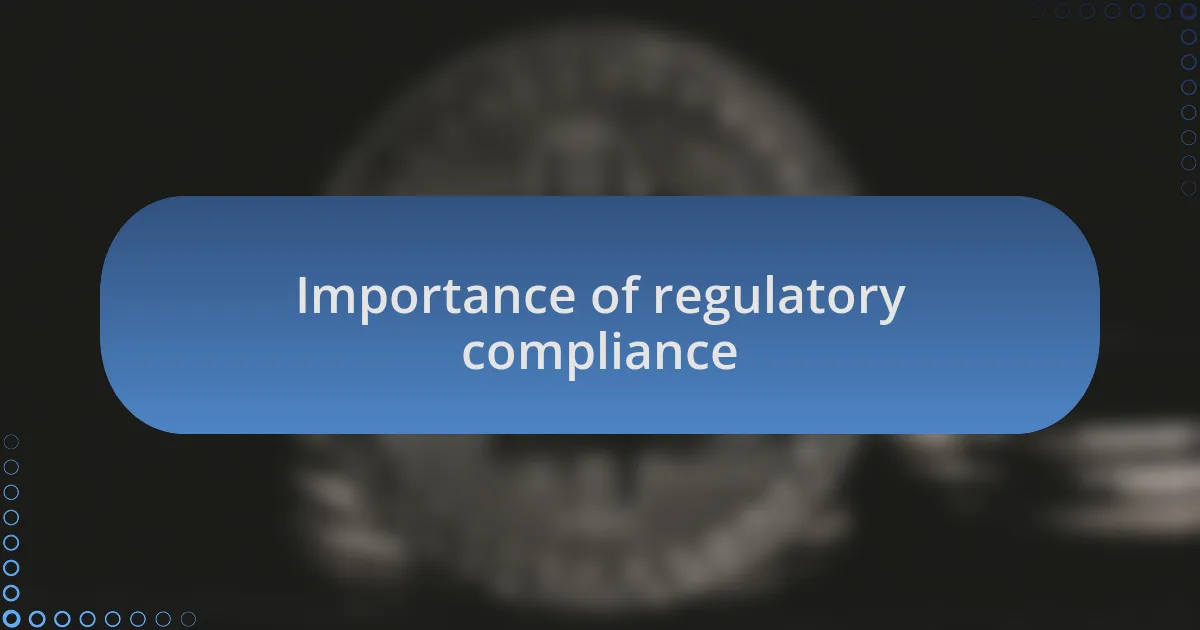
Importance of regulatory compliance
Regulatory compliance is not just a box to check; it’s a safeguard for our investments and the wider industry. I can’t help but think back to a time when I overlooked compliance in a budding project. It ended in a scramble when the company faced legal scrutiny, reminding me that comprehensive adherence to regulations can prevent abrupt market exits or costly fines. Isn’t it better to take the time to understand the rules than to risk everything on a hunch?
When I consider the importance of regulatory compliance, it strikes me how it builds trust—not only among investors but also within the wider community. For instance, I once participated in a project that made transparency central to its ethos. The regulations were strict, but that commitment to compliance paid off. We attracted more investors who felt secure knowing that the project respected legal frameworks. Doesn’t that kind of reliability appeal to you when choosing where to invest?
Furthermore, the landscape of financial innovation is vast, and navigating these waters requires a deep understanding of compliance as a dynamic force. I’ve seen ventures that thrived because they were proactive about adapting to regulatory changes. While compliance can feel like a burden at times, I’ve learned that it often paves the way for growth. Have you experienced a similar epiphany? Embracing the regulations can transform potential obstacles into stepping stones for sustainable success.
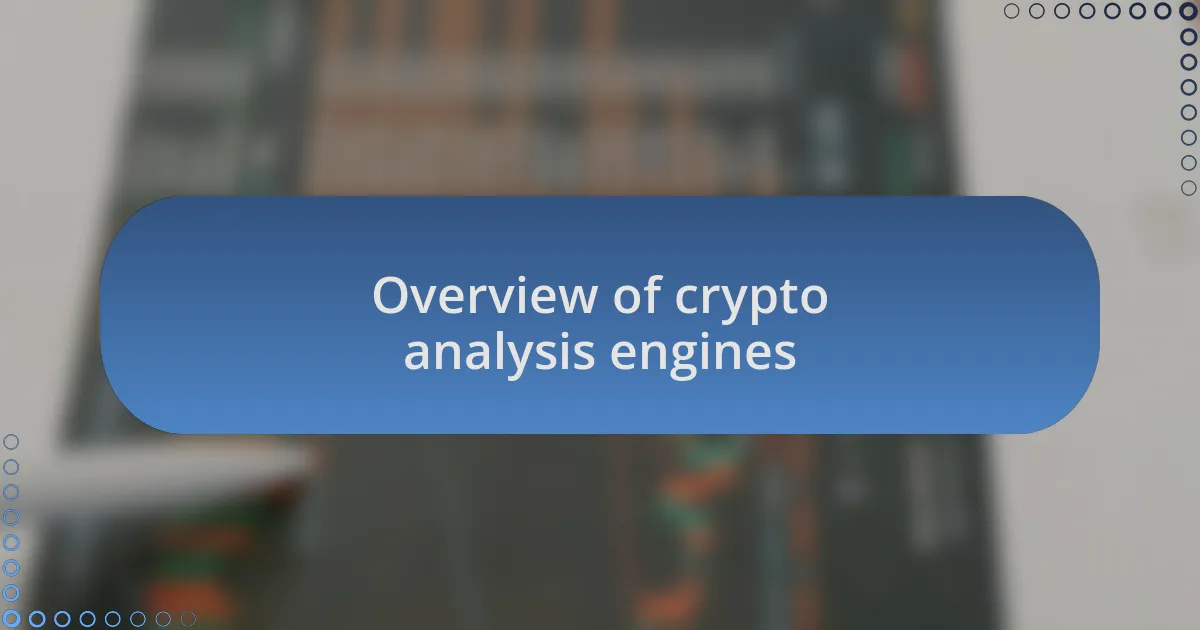
Overview of crypto analysis engines
Crypto analysis engines serve as essential tools in the realm of cryptocurrency, providing insights that help investors and users make informed decisions. When I first encountered these engines, I was amazed at how they aggregate vast amounts of data—from market trends to transaction histories. This data-driven approach not only reveals patterns but also equips users with the knowledge needed to navigate the sometimes turbulent waters of the crypto market.
What truly sets these analysis engines apart is their ability to leverage advanced algorithms. I remember experimenting with one specific engine that utilized machine learning to predict price movements. The results were eye-opening—seeing predictions align with actual market behavior reinforced my belief in the power of technology to guide investment strategies. Isn’t it fascinating how such tools can transform raw data into actionable insights?
Moreover, crypto analysis engines offer a unique blend of accessibility and sophistication. I once shared my experience with a novice investor who was overwhelmed by the sheer volume of information available online. Introducing them to a user-friendly analysis engine was a game changer. They quickly found themselves more confident, making investments that were informed rather than speculative. Have you ever felt that shift from uncertainty to empowerment through a reliable resource? It’s a reminder of how powerful the right tools can be in this evolving landscape.
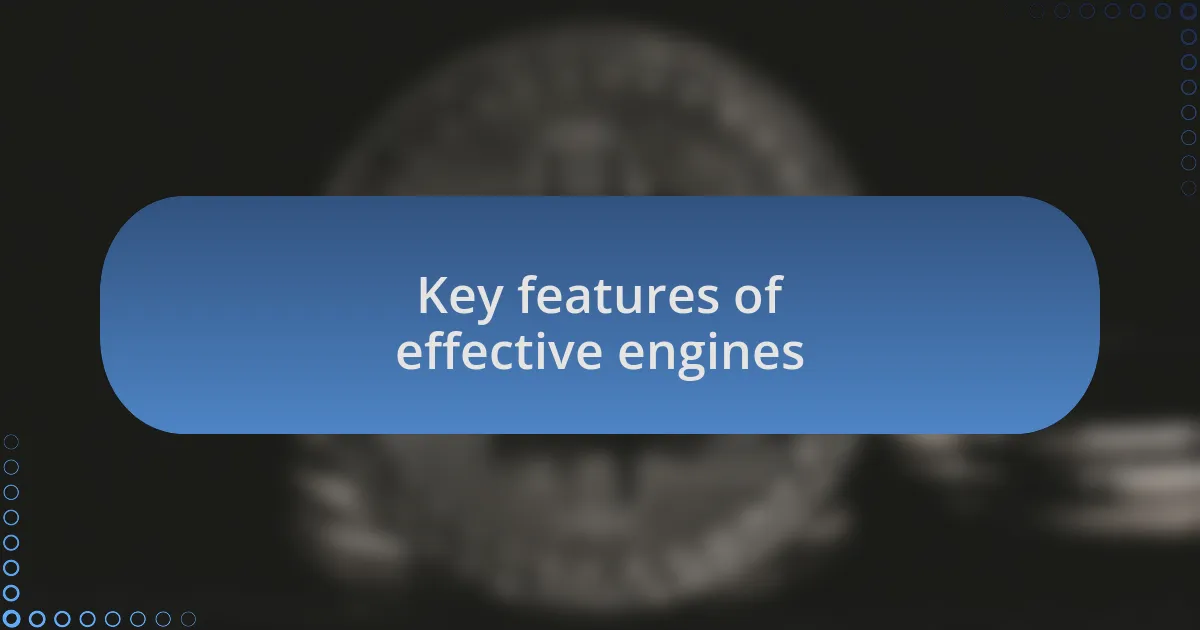
Key features of effective engines
One of the key features of effective crypto analysis engines is real-time data processing. When I first used an engine that updated information instantaneously, I felt like I had a competitive edge in the market. It was incredible to see how quickly I could react to price fluctuations or emerging trends, which often meant the difference between a missed opportunity and a successful trade. Don’t you think having up-to-the-minute data can drastically influence trading decisions?
Another crucial feature is the ability to customize analytics according to user preferences. I distinctly recall my experience when I tailored alerts and dashboards to focus on specific cryptocurrencies I was interested in. This personalization not only streamlined my analysis process but also made me feel more in control of my investments. Isn’t it comforting when a tool adapts to your unique needs rather than forcing you to conform to its limitations?
Lastly, comprehensive educational resources complement an effective crypto analysis engine. I appreciate platforms that offer tutorials and guides alongside their analytical tools. One time, I dove into a series of webinars provided by such an engine, and it not only deepened my understanding but also boosted my confidence. Have you ever been through a learning curve that transformed how you approach an investment? These resources can turn a complex landscape into a navigable path.
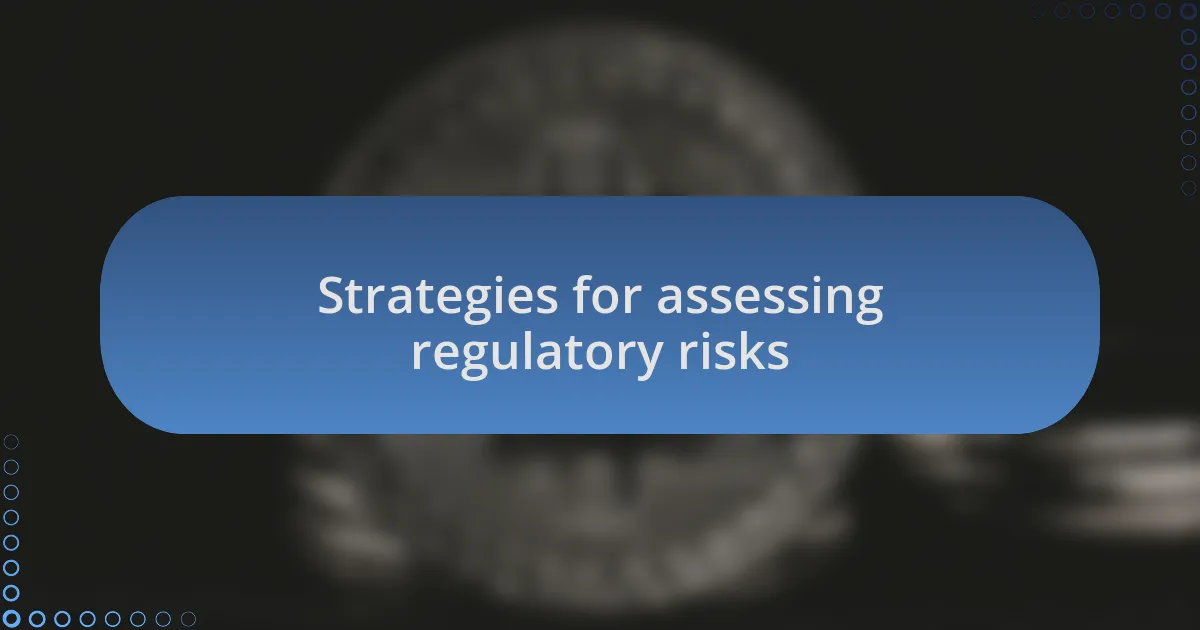
Strategies for assessing regulatory risks
Identifying regulatory risks starts with staying informed about the evolving legal landscape. I remember when I dedicated time to analyze changes in regulations in my jurisdiction and found that awareness can provide a significant advantage. It’s fascinating how a seemingly small update in the law can create ripples throughout the market—have you ever noticed how quickly sentiment can shift when new regulations are introduced?
Engaging with legal experts can be a game changer for understanding potential pitfalls. In my own experience, partnering with a compliance consultant gave me a clearer picture of risks related to specific cryptocurrencies. Their insights often highlighted aspects I had overlooked, which led me to reconsider certain investments. How can you ensure that you’re not missing any critical advice that could safeguard your assets?
Using scenario analysis is another effective strategy, as it allows one to anticipate and prepare for various regulatory outcomes. I once ran simulations on how particular regulatory changes could impact my portfolio, leading me to adjust my strategy proactively. It felt empowering to approach regulatory risks not just as obstacles but as opportunities to innovate my investment approach. Isn’t it invigorating to be equipped with foresight rather than merely reacting when challenges arise?
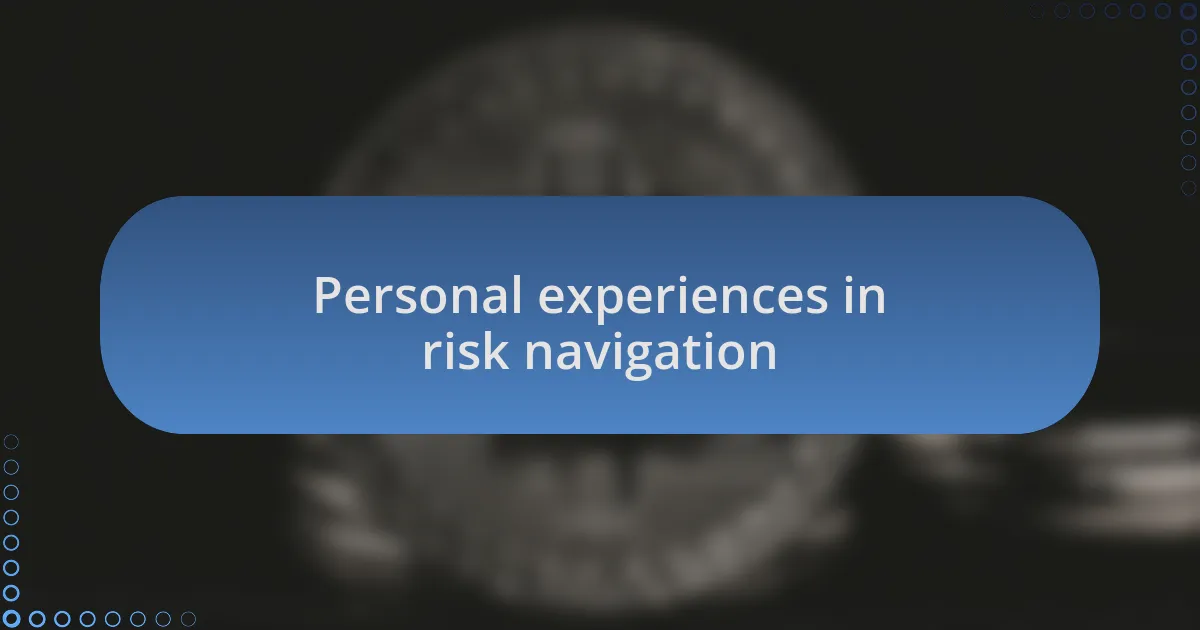
Personal experiences in risk navigation
Navigating regulatory risks has often meant finessing my reactions in real-time. One incident stands out: I was deeply invested in a new cryptocurrency that suddenly faced scrutiny from regulatory bodies. Watching the volatility of that asset as news broke was nerve-wracking. I remember thinking, “How would I explain holding onto this if the regulations change overnight?” That question pushed me to reevaluate my risk tolerance and adjust my approach.
During another experience, I faced a tight deadline for submitting a compliance report. Panic set in as I realized that I didn’t fully understand all the requirements. I reached out to a mentor who guided me through the complexities, and it was a relief to have that support. I learned firsthand how vital it is to cultivate a network of knowledgeable individuals when navigating uncertainties. Have you ever felt that sense of urgency drive you to seek help?
A particularly difficult lesson came when I underestimated the impact of a minor regulation that eventually became a significant barrier for many investors. I hadn’t initially taken it seriously, thinking it was just another bureaucratic hurdle. Reflecting on that time, I now understand the importance of reevaluating even seemingly unimportant regulations. It begs the question: Are we too quick to dismiss changes that could affect our investments down the line?

Lessons learned and best practices
Understanding and adapting to regulatory landscapes is a continuous journey. I recall a time when I approached a new crypto project without fully dissecting its compliance framework. The moment I discovered its lack of proper regulatory backing, I felt a sinking dread; it reminded me that due diligence is non-negotiable. Have you ever invested time or resources only to realize a critical piece was missing? That experience taught me to always conduct thorough research and prioritize compliance in every investment decision.
One of the most impactful lessons I learned was the importance of staying informed about evolving regulations. I remember attending a conference where a panel discussion highlighted anticipated regulatory changes. Listening to experts share their insights made me realize how easily I could have missed crucial updates. It reinforced my belief that dedicating time to ongoing education and staying connected to the industry is vital. How often do we think we know enough, only to find out there’s so much more to learn?
Building relationships with regulators can be a game-changer. Early in my career, I hesitated to reach out, thinking it would somehow compromise my position. However, after one candid conversation with a regulatory official, I understood the value of open communication. This kind of engagement not only fosters trust but also helps clarify complexities that can significantly impact our strategies. Have you considered how collaboration can turn a potential roadblock into a constructive dialogue?